Japan has a long list of occasions and customs when it comes to gift-giving, whether for friends, family or in business situations. We cover a wide range of events as well as give tips about cost, etiquette, what to say and other aspects when gifting (and receiving!) tokens of appreciation.
Table of Contents
- The Importance of Japanese Gifting Culture
- Giving Gifts in Japan By Occasion
- Omiyage: Giving souvenirs in Japan
- Temiyage: Bringing a gift when visiting someone’s home
- Temiyage: Gift giving in Japanese business
- Giving presents in Japan for birthdays & other special events
- Ochugen and Oseibo: Giving Seasonal Gifts in Japan
- Omimai: Bringing someone something to cheer them up when hospitalized
- Okaeshi: A Thank You gift in return
- Gifting Etiquette in Japan
The Importance of Japanese Gifting Culture
You might be thinking - who needs a guide to buying presents for someone? You think of something the other person will like, and that’s it, right?
While the very bare basic sentiments are the same, it’s not quite that simple in Japan. There’s a whole “gift” industry for it. It’s why there’s so many department stores with entire floors dedicated to sweets and gifts you would often never buy for yourself, but do so for others out of kindness (or sometimes obligation). It’s also why you can find flower shops at many stations, and so many food-related souvenirs at major stations and service areas.
It might feel like a lot of rules, and it does really depend on who you’re celebrating (some people nowadays don’t care as much if you get everything right), and culture is always changing albeit slowly, but these are just important cultural traditions to keep in mind, especially when gifting to superiors, elders and clients.
So what are these special occasions? Let’s take a look.
Writer's Pick
Giving Gifts in Japan By Occasion

Omiyage: Giving souvenirs in Japan
Whenever you take a trip somewhere, it’s customary to buy something as a souvenir gift. But what’s special about Japan?
We usually buy something not just for ourselves, our families and friends, but for our workplace as well! And it’s not just for big trips out of the prefecture, but people will often buy something if they went to an amusement park like Disneyland, or on a business trip. It’s also a thank you to coworkers who may have been inconvenienced by your absence.
It’s why it’s easy to find packages of individually wrapped items at souvenir shops in Japan, like small cookies, chocolates and snacks, because they’re meant to be passed out to various individuals. That way, we can leave it on their desk or hand it to them directly without worrying about whether they can eat it right away.
It’s good to keep in mind if you can find the local 名物 (meibutsu). Meibutsu is something famous from the area, whether the actual item is famous and beloved or it’s made using something that’s famous (such as anything apple related from Aomori).
It’s also a good conversation starter, as people will ask about your trip.
Note: It depends on the culture in your workplace, but sometimes people will expect omiyage if you talk about going somewhere on the weekend or over the holidays. So if you really don’t want to buy souvenirs for everyone for whatever reason, it’s best to keep plans to yourself. But if you’re on the receiving end of lots of omiyage from other coworkers, it doesn’t hurt to give something back once in a while.
Temiyage: Bringing a gift when visiting someone’s home
Being invited into someone’s home is often a big deal, as people often spend time together by going out, especially with acquaintances. At home, the host usually goes out of their way to make sure the guest feels welcome, which is not limited to preparing tea and/or coffee, snacks, perhaps even a meal. If someone invites you into their home, it’s customary to bring a gift as appreciation, whether it’s just for that person (and the people they live with), or something you can enjoy together during your time at the person’s home.
Good gift ideas include fruit, cake or other sweets to eat together (or just for them), tea or coffee, flowers, etc. Also try not to wait until getting to their nearest station to buy the gift, as it shows a lack of foresight and it’s something they see or might have often - unless it’s something perishable and/or the nearest station is a large one with many options.
Specifically for visiting someone’s home, you often wait until you’ve been invited further in and more settled before you give them the gift, instead of the moment they open the door. The exception is if it’s something that needs to be refrigerated or taken care of immediately (such as flowers), or if there’s other people who were invited - in that case, it’s better not to hand gifts in front of other guests unless you have something for them too.
Temiyage: Gift giving in Japanese business
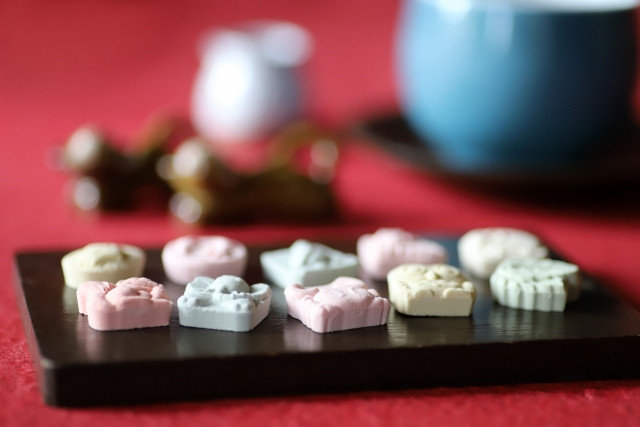
When visiting a client or someone you’re doing business with at their office, or having the very first meeting, or you’re visiting a client or branch for a business trip, or taking a client out, it’s best to get something that can be shared with their office or team (in the case that they’re a representative for the company). Thus, looking for a nicely packaged box with individual items is better. (These can be found at department stores. However, it’s important to get something special, such as a seasonal or location exclusive item.)
The timing which to hand the item is also key. If having a meeting, present the gift after the initial greetings and exchange of business cards (if applicable), but if having a meal, then waiting until the very end when everyone is leaving is a better timing.
Make sure you take the present out of the bag before handing it to them, and then offer the separately included bag should they need it.
(Yes, when you buy gifts in Japan, the store will almost always ask if you’d like an extra bag included so you can hand them a clean crisp bag to carry the gift home and not the same one you carried the gift in.)
Giving presents in Japan for birthdays & other special events (Valentine’s Day, New Year’s, weddings and funerals)
Birthdays have slightly less rules than when presenting gifts at the office. Of course, you should know the taste of the person you’ll be buying gifts for.
Shops will often offer gift wrapping, sometimes free, sometimes for a fee. And again, they will almost always ask if you want a separate bag.
For more about birthdays and gift ideas, check our article Express Your Wishes Properly: A Variety of Birthday Messages in Japanese
Valentine’s Day & White Day
Valentine’s Day in Japan is special in that it comes paired with another day: White Day. On Valentine’s Day, women gift chocolates and/or other sweets to men, and men return the favor on White Day.
This happens on an individual level between couples, as well as among friends and classmates, but it sometimes is done in companies as well.
When preparing for Valentine’s Day or White Day for your workplace, it’s best to consult the other members of your team to see what usually happens as each workplace is different. Sometimes the practice is banned at work as it leads to competition and stress at times due to the obligation to prepare things out of pocket.
But don’t be surprised to see long lines at high brand chocolate and sweets shops leading up to these days.
Christmas & New Year’s
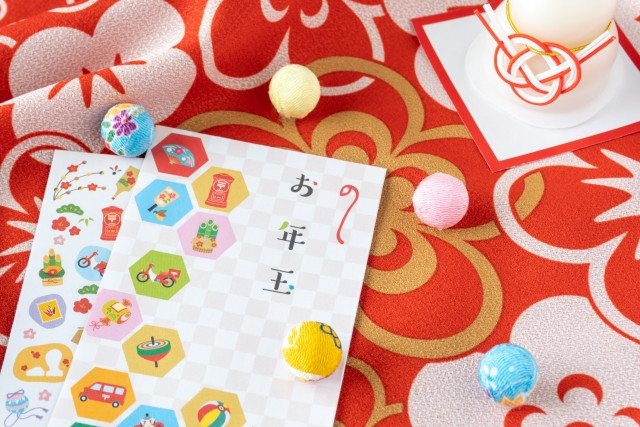
Christmas is usually more celebrated between family members and couples. But if you do Christmas present exchanges with friends or coworkers, sweets like baked goods or bath goods are good choices.
Children receive otoshidama, or New Year’s gift money, on New Year’s Day. They are given the money by their parents, relatives, and sometimes close friends of their parents. The money is given in ポチ袋 (pochi bukuro), small money envelopes just for otoshidama and gift money for children. Recently, there’s many designs of pochi bukuro, including with popular characters.
If you want to give money for otoshidama, the usual amount is as follows:
- 3~6 years old: 1000~3000 yen
- Elementary school: around 3000 yen (some give more for older elementary school students)
- Junior high school: around 5000 yen
- High school: around 5000~10,000 yen
- University: 10,000 yen (usually only the parents and relatives give them otoshidama, and only until they become a legal adult at the age of 20, or until they graduate from university).
Fold the bills so when they open it and pull it out, the numbers on the bill or coin are facing the front side of the envelope.
Write their name on the front (preferably upper left), and write your name on the back (preferably bottom left).
Weddings
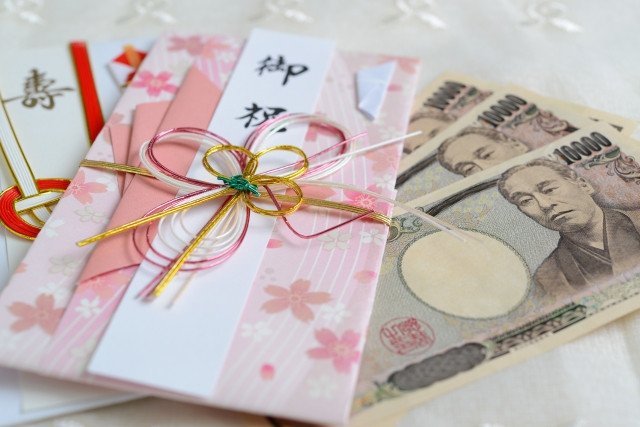
People give gift money for weddings. There’s a special envelope called お祝儀袋 (oshugi-bukuro) in which gift money is placed. The standard amount is 30,000 yen gifted from a single person, and 50,000 yen from couples. New crisp bills are expected for this gift.
Read more about Japanese weddings in our article:
Between Traditional and Modern, Weddings in Japan
Funerals
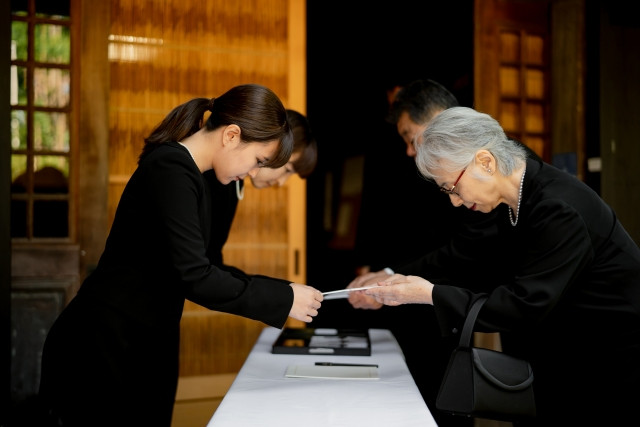
香典 (kouden) is gift money you offer to the deceased person’s family when you attend a funeral. Like weddings, funerals can cost quite a bit of money so it’s to pay respects and help ease the financial burden. Do not get crisp new bills for this gift.
The amount expected differs depending on your relationship with the deceased person, as family members are expected to pay more, and your age.
If the funeral is for your boss, coworkers or friend and you are in your:
- 20s: 5000 yen
- 30s: 5000 ~ 10,000 yen
- 40~60s: 10,000 yen~
Ochugen and Oseibo: Giving Seasonal Gifts in Japan

お中元 (Ochugen) is a summer gift sent to people that have taken care of you and supported you, and you want to thank. These are usually sent to people older than you.
The timing to send Ochugen is different based on which region of the country the person you’re sending to is in, so it’s important to do research. It usually falls between the beginning of July to mid-August. If you miss the time window of Ochugen, you can call it 暑中見舞い (shochu mimai) which is around the same time as Ochugen or 残暑見舞い (zansho mimai) which is toward the end of summer.
Popular gifts are things you can enjoy in the summer and keep cool and refreshed: summer fruits, fruits jelly, refreshing drinks like beer, juice, cider and other carbonated drinks, or practical items like towels and soap with summer motifs (fireworks, goldfish, wind chimes, etc.) as part of the design. The budget is around 3000 to 5000 yen.
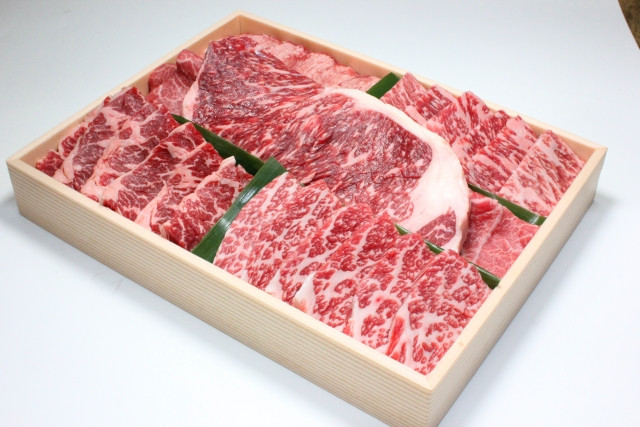
お歳暮 (Oseibo) is the end of the year equivalent of Ochugen. Again, the time you send Oseibo differs based on region, but you want them to receive it before the 20th of December. If you miss the timing, you can send it as お年賀 (Onenga) which is a New Year’s greeting, or as 寒中見舞 (Kanchu mimai) which is a winter season gift.
Popular gifts include things that can be shared with many people, such as good meat for hotpot, baked sweets, and nice alcoholic drinks like sake, whisky, wine, etc. As it’s a thank you for the entire year, Oseibo can be more expensive than Ochugen if you get something really nice, but the general range people spend is usually around 3000 to 5000 yen like Ochugen.
Omimai: Bringing someone something to cheer them up when hospitalized
When visiting someone at the hospital, it’s customary to bring something to cheer them up. Although flowers may be a go-to in the visitor’s mind, many people say that they are more happy to receive food gifts like snacks and sweets, along with books or comics to pass the time. Flowers are sometimes not allowed at hospitals as gifts, and even if they are, someone else might have already gotten them flowers. And of course, make sure to make an appointment to visit them so you don’t catch them at a bad time.
Okaeshi: A Thank You gift in return
お返し (okaeshi) means to return something, so this gift is in return for something someone did for you, or in return for receiving something (including gifts!) It’s used in both everyday life (people returning tupperware or things they borrowed along with some sweets), and for formal occasions (people who attend weddings and funerals will receive something when they leave). Other than for formal occasions, the okaeshi is not necessarily an obligation, but people do it to be nice and show appreciation. Small packaged sweets are a common okaeshi.
Gifting Etiquette in Japan
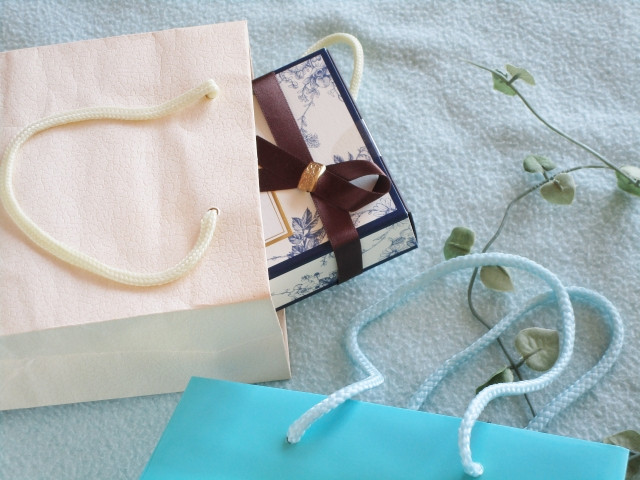
General Rules & Manners when Giving Presents in Japan
The Cost
Although each occasion has its own price range, as we’ve listed some specifics above, you also want to think about the balance between getting them something nice to show thought and consideration and also not making them feel obligated to get you something back (although it will probably still happen). Japan has amazing service and packages & wraps everything very nicely, so you can easily find something to gift that isn’t too extravagant, whether it be food or other gift items.
How to Give and How to Receive
Make sure to take the present out of the bag, turn the present so it’s facing the right way for the recipient, and present it by holding it out with both hands. When receiving the gift, make sure to receive it with both hands as well. It’s okay to ask if it’s ok to open it to the person, but if there’s multiple people present, save opening it for when you’re alone or just with the other person.
Note: Most people will refuse the gift at first as it’s polite to do so. They will only take it after being offered it two or three times.
Presentation of Gifts (wrapping, bag, etc.)
-
Avoid the unlucky numbers 4 (sounds like the worth for death) and 9 (sounds like the word for suffering) when buying things that come in multiples
-
Choosing wrapping paper in more light or pastel colors is best. Navy is also a safe choice.
-
Furoshiki or cloth to wrap gifts used to be more popular, but it's becoming a little less common now. But you may still see it from time to time.
-
As stated above, shops will often include a separate bag so the gift receiver can have a nice clean bag to take the gift home.
What to Say when Giving Gifts in Japan

Last but not least, what do you say when giving someone a gift or receiving one?
In more formal situations, for a long time, it was common to say “つまらないものですが (Tsumaranai mono desuga)” - “This is a trivial thing but…” as you hand the gift. It’s meant to show your humility as you present it, to try to make it seem like it’s not a big deal.
However, it’s starting to go out of style, as つまらない also means boring and insignificant, and why would you describe your gift as such?
So people have found other more suitable (and more positive sounding) options to say.
For example (these are all more formal):
-
お口に合うと嬉しいです
(okuchi ni au to ureshii desu)
I’d be happy if it suits your taste (basically “I hope you like it”);
There’s many similar phrases using お口に合う and it’s used for food only. -
心ばかりのものですが
(kokoro bakari no mono desuga)
or
ほんの気持ちですが
(honno kimochi desuga)
This is just a small token of my feelings. -
美味しいと聞いたので
(oishii to kiitanode)
I heard it was delicious; for food -
○○がお好きだと伺ったので。。。
(○○ga osuki dato ukagatta no de…)
I heard you like (blank) so…
For close friends and family, you can be more casual about it.
-
実はプレゼント(or お土産)があって...
(Jitsu wa present (or omiyage) ga atte)...
Actually, I have a present (souvenir) for you! -
ちょっとしたものだけど (気に入ってくれるといいな)
(Chotto shita mono dake do (kinitte kureru to iina))
It’s something small but (I hope you like it). -
いつもありがとう
(Itsumo arigato)
Thank you as always for everything you do (& then hand the gift to them)
To say thank you to the person for the gift, check out our article on how to say thank you:
Arigatou and more: How to Say Thank You in Japanese in All Types of Situations
To know what to write in order to say thank you to the person, check out our article here:
How to Write a Thank You Card or Message in Japanese (with Example Phrases!)
And after giving your gift, know how to say you’re welcome:
How to Say You're Welcome in Japanese - Don’t Default to Douitashimashite!














.jpg)




















